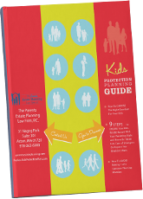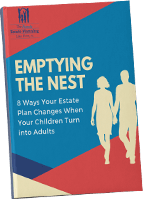One of your most important responsibilities you have as a parent is to select and legally document guardians for your children. This doesn’t mean naming godparents, or just trusting the grandparents will step in if necessary. It means consciously deciding who would raise your children if you cannot, and then legally documenting your choices. (Making sure the people you’ve chosen know what to do if they’re ever called upon is the final critical step!)
Two weeks ago, we shared the first part of our series on selecting and naming the right guardians for your children. If you haven’t read it yet, you can read Part 1 here. Today, in part two, we’ll discuss the final three steps in the process.
4. Narrow candidate list, and rank your choices
After you’ve come up with all of the potential candidates for guardian, narrow down the list to your top five people. There’s no guarantee that your ideal candidate(s) will be willing to serve as guardian, so having more than one or two is a practical necessity.
To aide in this process, you should consider things such as who loves your children and with whom do your kids really get along the best? Will this person be physically, mentally, and emotionally able to raise your kids to adulthood? The most important thing is to choose SOMEONE, even if you aren’t 100% sure about them. If you don’t, a judge who doesn’t know your family will choose for you. You can and should review and adjust your plan frequently as your children grow up, you can always change your mind, and their guardians, later.
Next, rank your choices from top choice down to last. Again, backups are critical in case your first choice cannot serve.
5. Sit down with top candidates and discuss what’s involved
When it comes to asking someone to be your child’s guardian, you need to provide crystal-clear guidance about what that means and what’s involved. The discussion should cover all of your expectations about how you want your kids raised. Speak openly about finances, discipline, education, spirituality, and any needs that are unique to your children.
Once the discussion is complete, give them a few days to carefully consider the choice, even if they seem immediately gung-ho about doing it. Depending on the age of your kids, this could be a more than decade-long commitment. If they don’t carefully think it over, the responsibility can easily turn into resentment.
6. Legally document your plan
It’s essential to legally document your choice as soon as possible. Verbal commitments mean nothing in the eyes of the law. This is especially true when you name a friend over a family member.
It doesn’t have to be painful, complicated, or drawn out. In fact, nearly 100% of parents who meet with us, even if they don’t become clients and work with us, walk away from their Family Wealth Planning session having identified guardians for their children.
With us as your lawyers for life, you’ll have trusted advisors who can help you navigate all of the legal, insurance, financial, and tax issues involved with estate planning. We can put a plan in place that protects your family’s future so that you can live for today.
When you’re ready, call our office at 978-263-6900 and speak with Paula, our Client Services Director, who can schedule your family’s complimentary two-hour Family Wealth Planning Session, where we’ll cover naming guardians, and much more.
Until then, to your family’s health, wealth, and happiness!
![]()
David Feakes
P.S. Want to get started on the most important planning you’ll ever do for your family? Give our office a call at (978) 263-6900 to get started. You’ll be so glad you did.
David Feakes is the owner of The Parents Estate Planning Law Firm, PC – a law firm for families in the Acton, Massachusetts area. David helps parents protect the people they love the most.












